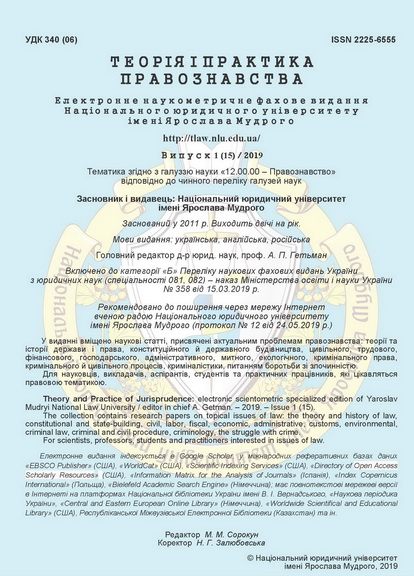Comparative analysis of demilitarized and neutralized territories in international law
DOI:
https://doi.org/10.21564/2225-6555.2019.15.168741Keywords:
demilitarization, neutralization, demilitarized territories, disarmament, neutrality, theAland IslandsAbstract
Different approaches to the definitions of “demilitarized zone” and “neutralized territory” were analyzed. The overview of international practice has provided an opportunity to make the following conclusions as to the identity of these phenomena before the First World War and their regulation by peace agreements after. Aftermath of the world wars there were mostly cases of conclusion of bilateral and multilateral agreements that envisaged either demilitarization or neutralization of territories, or both options at the same time. Clarification is made on the following approach of defining demilitarization as a synonym for disarmament. In particular, it is concluded that the latter is an integral part of demilitarization and demobilization. It is proved to be inappropriate to identify the concepts of “neutralization” and “neutrality” since the latter determines the legal status of a State, whereas neutralization defines the legal status of a part of a State. Based on the comparative analysis of demilitarized and neutralized regimes, applying the criteria of their objectives, legal framework and duration of functioning, common and distinctive features of such regimes could be defined. It is summarized that demilitarization and neutralization of territories provide peace and security, and serves for a prevention of armed conflicts, having positive effect on the settlement of post-war disputes between StatesReferences
Antypenko, V.F., Tymchenko, L.D., Biehlyi, O.V. (2012). Mizhnarodne publichne pravo. (Vol. 1). Kyiv: NAU [in Ukrainian].
Chillaud, M. (2006). Territorial Disarmament in Northern Europe. The Epilogue of a Success Story? SIPRI Policy Paper No. 13. URL: https://www.sipri.org/sites/default/files/ files/PP/SIPRIPP13.pdf.
Marshall-Cornwall, J.H. (1935). Geografic Disarmament. A Study of Regional Demilitarization.London:OxfordUniversityPress.
Klymenko, B.M. (1963). Demylytaryzatsyia y neitralyzatsyia v mezhdunarodnom prave.Moscow: Yzd-vo Ynstytuta mezhdunarodnikh otnoshenyi [in Russian].
Protocol Additional to the Geneva Conventions of 12 August 1949, and relating to the Protection of Victims of International Armed Conflicts (Protocol I), 8 June 1977. URL: https://ihl-databases.icrc.org/applic/ihl/ihl.nsf/Article.xsp?action=openDocument&documentId=1DA6804D318A5157C12563CD0051DE08.
Commentary of 1987 to Protocol Additional to the Geneva Conventions of 12 August 1949, and relating to the Protection of Victims of International Armed Conflicts (Protocol I), 8 June 1977. Demilitarized zones. URL: https://ihl-databases.icrc.org/applic/ihl/ihl.nsf/ Comment.xsp?action=openDocument&documentId=6E3CDC1888743A5BC12563CD00435337
Ahlström, C. (2004). Demilitarised and Neutralised Territories inEurope. Aland Islands Peace Institute: Mariehamn.
Dictionary by Merriam-Webster: America's most-trusted online dictionary URL: https://www.merriam-webster.com/dictionary/demilitarization#other-words.
Salmon, J. (2001). ‘Démilitarisation’ (Demilitarization), Dictionnaire de droit international public (Dictionary of international law).Brussels: Bruylant.
Gleichmann, C. (2004). Disarmament Demobilisation and Reintegration a practical field and classroom guide. Stockholm.
Åkermark, S., Spiliopoulou, S., Heinikoski, S. (2018). Demilitarization and International Law in Context: TheÅlandIslands.New York: Routledge.
Kingma, K., Schrijver, N. (2013). Demilitarization. Max Planck Encyclopedia of Public International Law.
Treaty of Peace with Italy signed at Paris, on 10 February 1947. UNTS, Vol. 49, No. 747 URL: https://treaties.un.org/doc/publication/unts/volume%2049/v49.pdf.
Hannikainen, L. (1994). The Continued Validity of the Dernilitarised and Neutralised Status of the Aland Islands. Max-Planck-Institut für ausländisches öffentliches Recht und Völkerrecht 54, No. 3.
Convention relating to the Non-Fortification and Neutralisation of the Aaland Islands. Geneva, 20 October 1921. Treaty Series, League of Nations. (Vol. 9, p. 211–221). URL: https://treaties.un.org/doc/Publication/UNTS/LON/Volume%209/v9.pdf.
Marion, L. (1992). ‘L’introuvable neutralisation du canal de Suez’ (The elusive neutralization of the Suez Canal). Stratégique, No. 54.
Coutau-Bégarie, H. (1995). Le désarmement naval (Naval disarmament). Paris.
Verzijll, J.H.W. (1970). International law in historical perspective. (Vol. III, State territory).
The Korean Armistice Agreement signed on July 27, 1953. URL: https://peacemaker.un.org/sites/peacemaker.un.org/files/KP%2BKR_530727_AgreementConcerningMilitaryArmistice.pdf.
Constantinople Convention signed on October 29, 1888. URL: https://loveman.sdsu.edu/docs/1888ConstantinopleConventionon.pdf.
Downloads
Published
How to Cite
Issue
Section
License
Copyright (c) 2019 Theory and practice of jurisprudence

This work is licensed under a Creative Commons Attribution 4.0 International License.




